
SEVA
“Seva”
is a Sanskrit word meaning “selfless service” or work
performed without any thought of reward or repayment. It is very similar
to Nishkama Karma or Karma Yoga which is the advice given by Lord
Krishna to Arjuna in the Sreemad Bhagavad Gita. He tells Arjuna about
the great benefits to be got from doing things for others without any
hope of personal gain. “Karmanye adhikarastu ma phaleshu
kadhachana”, is what he says. “You have a right to do action
but you have no right to ask for the fruits of the action.” This
may seem to be a strange thing to say but the fact is that there is a
law which operates in the whole of the universe which controls the
effects or end product of any action. We have no control over it even
though we fully believe that everything is in our control.
The
whole world runs on the wheel of “cause and effect”. Every
cause must have an effect. This is the Law of Karma which is only the
third Law of Motion in Physics which says that “every action has
its equal and opposite reaction”. In each of our actions we are
starting a “cause” which must have an effect but though the
“cause” is in our hands the “effect” is not. Of
course the “effect” would normally depend on the
“cause” but in the case of the human being this need not
necessarily be so. The reason for this is that the effect depends on our
intention and attitude and not on the actual performance of the action.
A nurse serves a man in the hospital and his wife also serves him. The
attitude of both is quite different. The nurse does it as some work
which she is forced to do in order to get the pay; the wife does it with
love with no hope of any remuneration. Though the work is the same, the
attitude of seva is missing in the work which is done by the nurse.
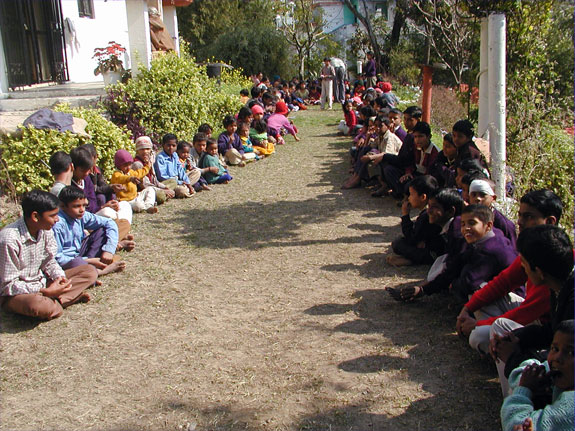 On Sundays children
arrive at Vanamali ashram freshly washed
to sing
bhajans
and enjoy milk & cookies.
On Sundays children
arrive at Vanamali ashram freshly washed
to sing
bhajans
and enjoy milk & cookies.
This
is why Lord Krishna insists that we have only a right to do our duty
and we have no right to demand our dues!! In any case the dues are not
in our hands but in the hands of a cosmic power which of course is
extremely fair. All of us can be certain that we will get our just dues,
neither more nor less even though we may not agree that we get what we
deserve. We always think we deserve more than we get! Thus
“seva” is the art of blessed action in which the act is a
gift to everyone involved. It helps our own spiritual growth and
contributes to the welfare of the person or community for whose sake the
seva has been done. Our Puranas extol the axiom, “manava seva,
Madhava seva” service of our fellow beings is equal to worship of
God. Hence Lord Krishna’s advice while doing any seva or any
action, is to do it as an offering to God, who is lodged in the person.
This is the right attitude by which any seva is to be done. If it is
done with this attitude there will be no disappointments since our duty
is only to serve God in the person and not to ask for anything in
return. Whatever we get in return will be considered as
“Prasad” or something holy. “Prasad” means the
remains of something which has been offered to God.
Very
often we do so much for someone or for the society yet we feel that our
efforts have not been given due recognition and that we deserve
something better. This feeling of frustration is only caused by the fact
that we have great expectations. Consider yourself to be an instrument
in the hands of God, is another of Lord Krishna’s comments. When
we do or give anything to anyone this fact must be clearly remembered
that we have come to the world with empty hands and will leave with
empty hands and if at this moment we have something in our hands which
we are able to give to someone, it should be given with the attitude
that, “I am not the donor. Anything that I give, any service that I
might render is only given to me by God. Thus I have no right to demand
or even expect any return from the other party, “NOT EVEN
GRATITUDE”. If seva is done with this attitude, there will be no
disappointments and whatever we get will bring us only happiness.
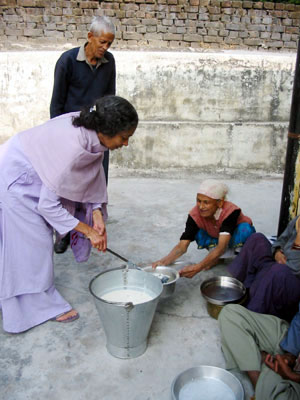 Feeding the
members of the Tapovan Leper Colony
Feeding the
members of the Tapovan Leper Colony
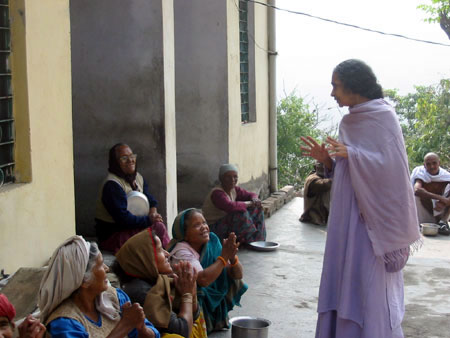 Tapovan Leper Colony
Tapovan Leper Colony
Hinduism
gives another angle to the doing of seva. We should be grateful to God
for having given us an opportunity to serve others. Not everyone gets
this type of opportunities. When we do something for another we should
be grateful to that person for accepting our service. They are the ones
who have done a service to us and not the other way round. Both
“dana” – charity and seva should be done with this
attitude.
The
Taittiriya Upanishad says, "Give. Give with faith. Do not give without
faith. Give with sensitivity. Give with a feeling of abundance. Give
with right understanding."
The Hindu
worldview holds that all beings are interconnected as God dwells within
all beings. “Vasudeva Kudumbam”, is another great axiom in
Hinduism. This means that the whole world belongs to one family and that
is the family of God. If we see anyone suffering in our family it is
our duty and our joy to help them without any thought of reward. Every
person in our family should be given the same consideration that we give
to ourselves. To see the suffering of another as something separate
from oneself, or as "someone else's problem," is to move away from this
great dictum. Nobody is alien to us. We are all inter-connected in some
way or other to everything else in this universe. Nothing in this world
is really our own, the ego is the veil that keeps us from perceiving the
true nature of existence as One.
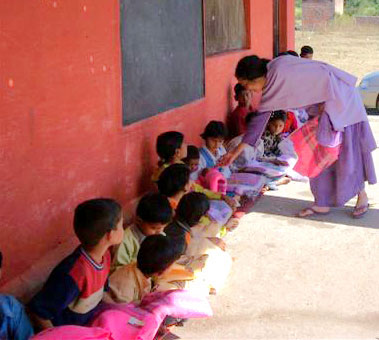 Mataji distributing food and shawls to poor children at a school near
Rishikesh
Mataji distributing food and shawls to poor children at a school near
Rishikesh
Therefore,
any help you render to others is actually another way of helping
ourselves to grow spiritually. Disinterested service of humanity is the
greatest “puja” or worship of God.
Sometimes
people are fired with the ambition to change the world and to make a
mark on humanity through the charitable deeds that they might perform.
But it is well to remember that it is virtually impossible to change the
world in one fell swoop. Many avatars and many reformers and saints
have come but none of them have been able to change the whole world. But
this need not be considered as a failure. It is far better for you to
concentrate on the community around you, the town or village in which
you live, the relationships you have created, and the lives of those
you're able to touch. There is nothing great or small in the eyes of
God. The slightest effort on our part to help anyone is seen in its true
perspective by God. Even pouring water over a dried plant or giving
something to a hungry animal can be considered as a great seva.
God
does not ask you to do something which is of great national or
international importance. All that is expected of you is to give as much
as you can as long as you can. This type of seva is a gift which serves
others without even spending a thought on what we might gain from such a
gift. Our only thought is for the receiver of the gift. To serve
endlessly and effortlessly is the very essence of seva. Anything done
with great effort and the feeling that we are doing something great,
cannot be considered as seva. In order to stop us from getting too
egoistic about our altruism, Lord Krishna advises us in the Bhagavad
Gita to perform action for the sake of action, for the sake of the
divine that is lodged in every living creature with no expectation of
personal reward or recognition. The seva is to be done without grudging
the amount of time or money or effort which we expend on it. Humility is
the greatest of all attitudes. However wonderful your actions and
however great your gifts to people, they will all be null and void in
the eyes of God if it is done with the attitude that you are indeed a
great soul. Seva done with the attitude that you are only an instrument
of God will bring untold benefits to all concerned even though you may
not even be aware of it. This is the highest type of seva and will
purify both the donor and the receiver.
Hari Aum Tat Sat
|
Hari Aum
Paramhansa Yogananda Trust
Report on Assessment Trip to Mataji Devi Vanamali’s Giridhari Ashram in Gaja
23-27 May 2015
Mr
Mohanji of Vanamali Ashram accompanied Manjunath to Rishikesh and later
to Gaja (in Tehri district) to share the details of the community
service programs the Ashram is involved in since the year 1985. The
community outreach program grew organically which started Mata Devi
Vanamali’s (lovingly and respectfully called Mataji) love for children
and various group activities organized for them.
Manjunath of
Paramhansa Yogananda Trust, facilitated this joint assessment in
consultation with Mataji and Mohanji (Mataji’s brother). The methods of
assessment included: interview with founding school teachers,
interaction with widowed Women, community visits and interactions,
interaction with an NGO representative and community volunteer.
Over years Mataji
felt that Rishikesh is getting crowded and becoming too hot during
summer. Hence, she decided to move to Gaja, a hill town north of
Rishikesh at a distance of 65 km. Mataji’s son helped them to buy a
property and construct a house and develop a farm that is named as
Giridhari Ashram. Mataji spends close of six months of the year
from April-October in Gaja performing her sadhana, writing, preparing
for discourses and lectures.
Ever since Mataji has moved to
Gaja, she has always reached out to the needy through social service
and spiritual counseling to help them with material and spiritual
development. The current community service program in Gaja has grown
from Mataji’s natural response to the needs of local community. Mr
Mohanji (Mataji’s brother) has been directly overseeing these service
programs and takes care of executing the work and overseeing the
finances.
Brief detail on the programs carried out Giridhari Ashram in Gaja:
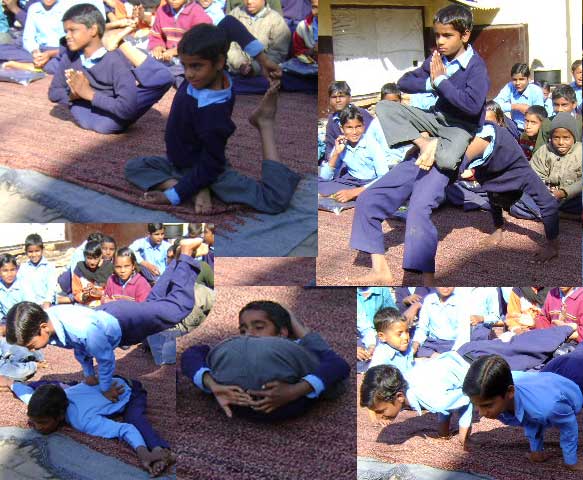 Children
at school for handicapped doing Yoga.
Children
at school for handicapped doing Yoga.
School support
program: A total of 23 schools (22 are government) in and around Gaja
received class room furniture, annual supply of note books, and uniform
to students (that was stopped two years back as government started
providing school uniforms. In addition schools are provided with
computer, playground and sports equipments.
Support to Shikhar Scholars
Academy: Ashram supports Shikhar Scholars Academy, a private school in
Gaja with volunteers, conducting special classes on Gita, moral values
and other life skills. Recently, Mataji has mobilized Rs.20 lacs to
construct a new building for senior wing along with necessary
infrastructure such as lab, play ground and class rooms. This school is
doing extremely well with close to 375 children (average no. of
children in other schools is 25). With the additional infrastructure in
place, the school will seek CBSE affiliation to add IX and X grade. The
school is run by three qualified, committed, enthusiastic and bright
youth from the nearby villages. Though, school collects fee of
Rs.300/month, they are unable to pay a salary that is attractive enough
for the teachers. Most of the teachers employed get far less than what
they can get in a government school.
Ration and Pension support to
widows: Currently, 42 widowed women are getting monthly ration supply
of which 17 women are also getting monthly pension of Rs.1000/- The
monthly ration supply provided includes: Rice-5kg, Sugar-1kg,
Dal-500gms, Tea powder – 150gms costing an average of
Rs.220/person/month. This program is currently supported by Mataji’s
sister (many other programs too). In the last two weeks, following
telephone conversation with Cecilia of Paramhansa Yogananda Trust,
Mataji and Mohan have spread the word around asking more needy widows
to register for the monthly ration. As a result, another 51 widowed
women have enrolled. This number is expected to increase through word
of mouth. Mohanji checks the credentials of the women seeking support
through their bank statement (it should reflect that they are getting
widow pension of Rs.800/month from government), and reference check
through village heads, school teachers and other
leaders.
Amar Jyoti School
Provision of Tin Sheets for
roofing: Tin sheet are provided to replace and improve the houses with
collapsed roots with Patali (slate stone slabs). This is provided to
about 20 households. This is done with physical verification of the
houses and after assessing the economic condition of the householder.
Each house gets to improve only one room.
Income generation program for
Women: A program was started to involve women in greeting cards making
using dry flowers and leaves and jute products. About 25 women came
forward to participate and this was successfully run for about 3 years.
Later, this couldn’t be sustained due to lack of market and inadequate
returns. Women too slowly lost interest as they were asked to work on
peace rate basis instead of daily wages. Two local women received
training and were coordinating this program and lacked motivation to
sustain the work.
Distribution of clothes: Several
of Mataji’s relatives and friends collect used clothes and send them
for distribution. Most of the clothes distributed include ones for the
women and children.
Organization arrangements: All
the work is managed by Mohanji with Mataji’s support. Funding for these
activities is mainly from Mataji’s sister, son, daughter and other few
close friends and devotees. The accounting is kept to basic without any
requirements for audits and returns. Few community members help in
identification of the needy and reference check. Mataji and Mohanji
have build trust and rapport amongst several such community members who
could be considered for increased responsibilities with some
honorarium.
It was heartening to note the
respect and gratitude the villagers express towards Mataji and Mohan.
They have built a very strong and trusting relationship with villagers
in Gaja and several other villages around Gaja.
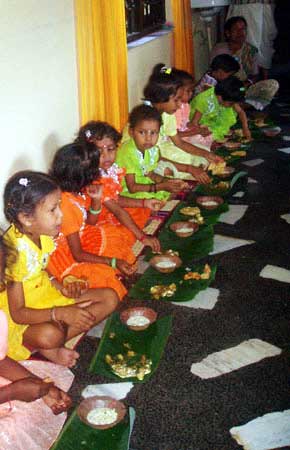 Nine
little girls are clothed and treated like goddesses
during the Kannya Puja of the Navaratri
festival
at Vanamali
Ashram.
Nine
little girls are clothed and treated like goddesses
during the Kannya Puja of the Navaratri
festival
at Vanamali
Ashram.
Main Action Points:
Extend the ration distribution
to as many widowed women as possible: It was realized that the food
items provided through ration helps the women to cope with the basic
nutrition needs of families. Several widowed women came to register for
this service and many more are expected to come. It was agreed
that the ration distribution can be extended to more widowed women. At
his point more than 51 additional women were registered and more are
expected. All these women will receive ration from June onwards.
Mohanji will verify and register women and also will make arrangement
for ration distribution through a local shop. It was also agreed that,
all women will get the revised package of Rs.360 from June.
Increase the items and quantity
of food: It was found that the quantity of food provided lasts for
about 10 days. Also, there are few other essential items that will help
the women to have a more complete package. It was agreed that a small
change will be made to the current quantities along with inclusion of
three more items. This will be reviewed after 2-3 months for a more
comprehensive list of items. However, a more efficient way of
distribution and monitoring method needs to be developed to manage this
increased number and quantity.
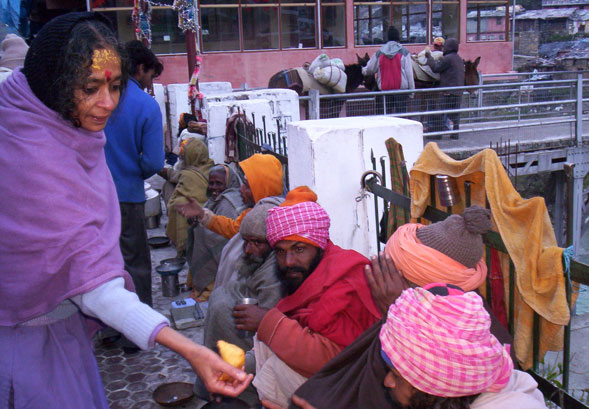 Mataji
feeding the poor at
Badrinath
Mataji
feeding the poor at
Badrinath
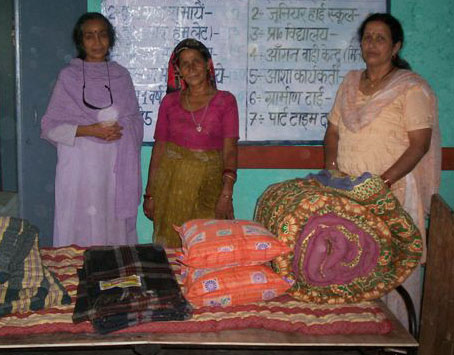
Vanamali Ashram donation of bed, mattress and blankets to the
local govt hospital (for women) Gajja, UR
Vanamali Ashram
Seva Includes:
- Providing monthly
ration of rice, wheatflour, daal, sugar, tea etc
to about 50 very poor
families, mostly widows and disabled.
- Providing roofing
sheets and tarpaulins to about 50 Families.
- Providing furniture
to 4 village
schools.
- Providing School
uniforms for chilldren in 14 villlage schools. (This was indeed the
most challenging job for me to get the right size and right
colour uniforms ordered and supplied!!)
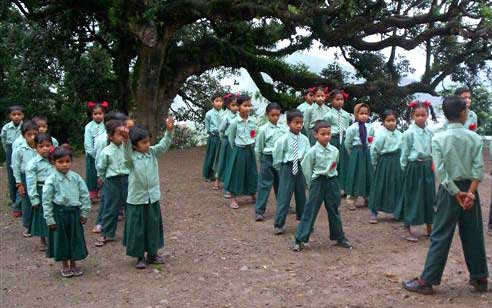
- Distributing notebooks, pencils,
school bags etc to deserving school students.
- Providing drinking
water to Gaja and Jaikot villages through tankers
during the acute water
shortage period of summer.
Apart from these help
is extended to individuals
on a need based basis
with whatever resources we have.
|

